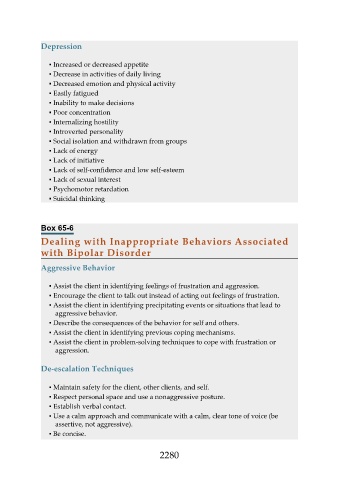Page 2280 - Saunders Comprehensive Review For NCLEX-RN
P. 2280
Depression
▪ Increased or decreased appetite
▪ Decrease in activities of daily living
▪ Decreased emotion and physical activity
▪ Easily fatigued
▪ Inability to make decisions
▪ Poor concentration
▪ Internalizing hostility
▪ Introverted personality
▪ Social isolation and withdrawn from groups
▪ Lack of energy
▪ Lack of initiative
▪ Lack of self-confidence and low self-esteem
▪ Lack of sexual interest
▪ Psychomotor retardation
▪ Suicidal thinking
Box 65-6
Dealing with Inappropriate Behaviors Associated
with Bipolar Disorder
Aggressive Behavior
▪ Assist the client in identifying feelings of frustration and aggression.
▪ Encourage the client to talk out instead of acting out feelings of frustration.
▪ Assist the client in identifying precipitating events or situations that lead to
aggressive behavior.
▪ Describe the consequences of the behavior for self and others.
▪ Assist the client in identifying previous coping mechanisms.
▪ Assist the client in problem-solving techniques to cope with frustration or
aggression.
De-escalation Techniques
▪ Maintain safety for the client, other clients, and self.
▪ Respect personal space and use a nonaggressive posture.
▪ Establish verbal contact.
▪ Use a calm approach and communicate with a calm, clear tone of voice (be
assertive, not aggressive).
▪ Be concise.
2280

